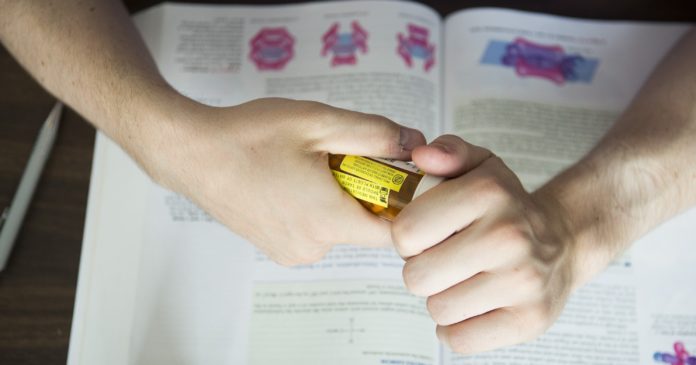
While alcohol abuse and binge drinking still top the list of substance abuse issues on college campuses, the non-medical use of prescription drugs is an issue of growing concern. Now, a new literature review on the topic has revealed that 1 in 6 college students misuse common stimulant medications prescribed for attention deficit hyperactivity disorder.
These common medications, including Ritalin and Adderall, are Schedule II controlled substances, placing them in the same legal bracket as substances such as cocaine and methamphetamine. According to the study, 17% of students are also risking legal trouble as well as health problems.
Study co-author Kari Benson from the University of South Carolina (USC) first became aware of this drug misuse when studying social impairment in children with attention deficit hyperactivity disorder (ADHD) as an undergraduate.
“People would ask me if I could get them Adderall or Ritalin,” says Benson. “I realized that this was a pretty prevalent issue on campus, and I wanted to see what I could do about it.”
People with ADHD often have difficulty paying attention and are more hyperactive than their peers. Stimulants can have a calming and focusing effect on people with ADHD and are prescribed for daily use in the form of tablets or capsules. In addition to improving ADHD symptoms, these stimulants can also improve self-esteem and social interactions.
According to the National Institute on Drug Abuse (NIDA), many young people believe that ADHD medication can enhance their study skills and improve their academic performance. However, while the drugs do promote wakefulness, there is no evidence that they improve learning or thinking ability when taken by people who do not have ADHD.
Results from previous research into collegiate misuse of ADHD drugs have varied. “If you looked at individual studies, the rates of college student misuse were all over the place,” says Dr. Kate Flory, the study’s lead author. “They ranged from 2% to 43%.”
To produce a more reliable estimate of the problem, Dr. Flory’s team conducted a meta-analysis of data from 30 papers assessing the prevalence of prescription stimulant misuse. The researchers published their findings in the journal Clinical Child and Family Psychology Review.
ADHD medications often shared within social circles
The analysis revealed that 17% of college students reported misusing stimulant medications for ADHD, either by taking medication without a prescription or taking a larger amount than prescribed.
The primary reason for misuse was to improve academic performance, but despite this, the results suggested that there may be some correlation between poor academic performance (low GPA) and ADHD medication misuse.
Stimulant ADHD medication was also used recreationally, often in combination with alcohol. Although the drugs were used for this purpose less frequently, the act of taking them with alcohol in order to prolong the amount of time a student can drink for is very dangerous.
“It makes it possible to drink beyond the normal limit,” explains Benson. “So instead of passing out drunk, you might end up in the hospital having to get your stomach pumped.”
Other adverse health effects linked to prescription stimulant misuse include high blood pressure, insomnia, malnutrition, feeling of hostility and paranoia and, in extreme circumstances, serious cardiovascular complications, including stroke.
The most common source of stimulant ADHD medication was among friends, indicating that there may be a network of students sharing these drugs on most college campuses. A qualitative review of the 30 studies also suggested that fraternity and sorority membership, academic performance and other substance abuse were associated with misuse.
The next step for the researchers is to use these new findings to examine specific characteristics associated with the misuse of the drugs, with a view to identifying targets for intervention programs on campuses.
“We have a substance abuse prevention and education office, and they have a group that’s focused on prescription medications,” says Dr. Flory. “We’ve pulled together an interdisciplinary group of researchers here at USC to apply for a grant from the National Institute on Drug Abuse, which would enable us to actually do an intervention on campus.”
